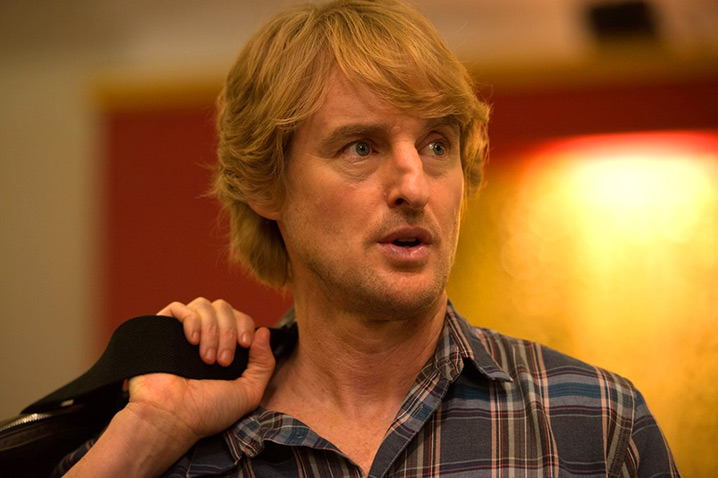 A loving father transforms into a ruthless survivalist in order to save his family from hordes of murderous pursuers in “No Escape,” a preposterous, monotonous action saga primarily notable for boasting a miscast lead and advancing a less-than-tolerant geopolitical fantasy. To say John Erick Dowdle’s film takes a negative view of its Southeast Asian setting would be an understatement, to the point that it doesn’t even explicitly denote where its action is taking place. Rather, it keeps such specifics vague until its finale, at which time it becomes slightly more obvious that Cambodia is the country being depicted as a dilapidated hellhole populated by rampaging rebels who—having staged a coup against a militaristic leader in league with European leaders—are on the lookout for Westerners, whom they view as exploiting invaders and seek to hack up with machetes.
A loving father transforms into a ruthless survivalist in order to save his family from hordes of murderous pursuers in “No Escape,” a preposterous, monotonous action saga primarily notable for boasting a miscast lead and advancing a less-than-tolerant geopolitical fantasy. To say John Erick Dowdle’s film takes a negative view of its Southeast Asian setting would be an understatement, to the point that it doesn’t even explicitly denote where its action is taking place. Rather, it keeps such specifics vague until its finale, at which time it becomes slightly more obvious that Cambodia is the country being depicted as a dilapidated hellhole populated by rampaging rebels who—having staged a coup against a militaristic leader in league with European leaders—are on the lookout for Westerners, whom they view as exploiting invaders and seek to hack up with machetes.
Amidst this urban-uprising maelstrom, in which masked hatchetmen roam streets and hotel lobby corridors hunting Caucasians, is Jack Dwyer (Owen Wilson), an engineer who’s just arrived in the country from Texas to work on a Western corporation’s water-purifying operation. Director Dowdle’s script (co-written by his brother Drew Dowdle) spends considerable time detailing Jack’s bumpy arrival in this foreign land, where lights don’t work and rides from the airport are provided by a cabbie who goes by the name “Kenny Rogers” (Sahajak Boonthanakit) because of his love for the country superstar. That ride is facilitated by another Western visitor, Hammond (Pierce Brosnan), whom Jack meets on the flight and shares a drink with at the hotel bar the night before revolutionary chaos explodes and Jack is forced, at a moment’s notice, to spirit his family away from one perilous hiding place to another.

The character-building early sections of the film paint Jack, wife Annie (Lake Bell), and daughters Lucy (Sterling Jerins) and Beeze (Claire Geare), as a wholesome clan prone to making jokes, clutching teddy bears, and showing each other compassion and affection. What they’re not, however, is interesting in any way. Worse still, their inherent goodness is so great, it destroys any trace of suspense, because it’s immediately clear the filmmakers have no intention of making these do-gooders suffer real harm (though a pants-peeing bit certainly shows the director’s willingness to humiliate his characters to engender sympathy for them and anger at their adversaries). Consequently, the film operates as a mind-numbing stream of running, crying, screaming and fighting, much of it shot by Dowdle in extreme close-ups and, for more anxious moments, in shaky handheld that seems to have been ported over from Dowdle’s prior found-footage horror films “Quarantine” and “As Above, So Below.”
While the faux-verité aesthetic devices of "No Escape" are wearisome, the director’s use of super slow-motion for intense dramatic moments is borderline laughable, especially during an unintentionally hilarious sequence in which Jack, like some sort of Olympic shot-putter, tosses his children from one rooftop to another and into the waiting arms of their mother. Incapable of selling this moment as well as just about any other, Wilson comes across as bland and unconvincing, lacking the physical presence necessary to be an everyman discovering the extreme lengths to which he’d go to protect his brood, much less as a Liam Neeson-ish badass determined to triumph at any (gruesome) cost.

“No Escape” knows its average-Joe protagonist couldn’t possibly navigate the hazards it sets before him, so it employs Brosnan’s Hammond—who, to no one’s surprise, is really a British secret agent trained in the art of gunplay—as a deus ex machina savior to rescue the Dwyers when things get a bit too hairy. Such clunky plotting is matched by the film’s pitiful political commentary, which peaks when Hammond explains to Jack that the rebels’ killing spree is actually justified because Westerners are exploiting the country for profit—a bit of tacked-on criticism that’s wholly at odds with the overarching portrait of Southeast Asians as faceless, nameless, nationality-indistinct monsters akin to bloodthirsty zombies. Reveling in xenophobia and then assuaging its guilt by criticizing the West too, it’s a disingenuous mess that’s only redeemed, if ever-so-briefly, by Brosnan’s amusing embodiment of Hammond as a ragged, dissolute 007 apt to change into sweatpants before hitting the strip clubs in order to “let them know I mean business.” [C-]





